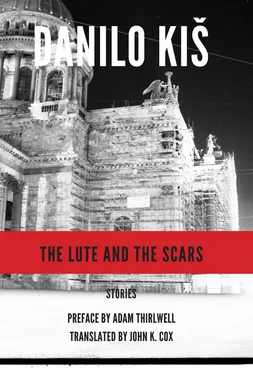Nikolaj Aleksinski was an old man with an upright bearing, short gray hair, and smiling blue eyes. He was as deaf as a door-knob, but that didn’t dampen his spirit or his good cheer one bit. He got up early, showered with cold water all year long (while you listened to him exclaiming “hu-hu-hu” and “ha-ha-ha” from the bathroom), and fasted one day every week, on Friday, for health reasons; on that day he drank only spring water that he had brought home from somewhere in a big demijohn. But this all had nothing to do with that nearly obscene resistance to death so typical of the elderly; this was more like a military kind of mental discipline paired with simple hedonism. I learned how to carry on a conversation with him by means of a kind of sign language. Our alphabet consisted of schematically reproduced letters from the old Cyrillic alphabet once used in Russian, and it contained symbolic abbreviations as well: touching one’s hair with a finger indicated the first letter of a word or the word itself: v as in volosy , hair; touching a tooth yielded z for zub , tooth; pressing your palms together gave you d as in druzhba , friendship. It sufficed to get across the first letters of words to him; once the word was underway, he completed it out loud while looking you straight in the eyes.
I show him: thumb and index-finger in the shape of a Cyrillic s , then close the circle by pressing my fingertips together ( o ), and touch my hair ( v ).
“Soviet,” he says.
I sign: l, i, t .
And he finishes the word by saying “literature”: “Soviet literature is still in its infancy,” he maintains. “Like new grass. One must be patient while it grows.”
I tell him (using my fingers): “Something is forever trampling on this grass.”
“Yet no one can stop the grass from growing,” he says. “Do you see that sumac tree out there in the courtyard? It grew up out of the concrete. Take a look at it.”
I say: “But people—”
He guessed my thoughts: “People can cut it back as much as they like; somewhere a new shoot will always come forth. Force its way through stone, or through concrete.”
I ask him, “Did you know Prince Ževahov?”
He stares at me in amazement. “Where did you pick up that name?”
I reply: “I read his book about Sergei Nilus.”
Nikolaj waves his hand.
“Ževahov lived in Novi Sad until recently. The Russian emigrants have their headquarters in Sremska Mitrovica. Ževahov was an unfortunate case. With age his mind dimmed considerably. He saw ghosts. Don’t you have anything better to do that to concern yourself with the likes of that mad Prince Ževahov?”
“I’m collecting eyewitness accounts,” I say. “In connection with Nilus, he wrote about The Protocols of the Elders of Zion . What did this Ževahov look like?”
“In his youth he was attractive, tall. The last time I saw him was back before the war. He was still wearing his old-fashioned pincenez and an Order of St. Nicholas on his shabby old dress coat.”
I give Nikolaj the manuscript of my first book. (It would end up being published three or four years later.)
“It’s as if you belonged to the circle of the Serapion Brothers,” he says. “There are hints here that you share the same artistic program. Your reality is a poetic one.”
I say something to the effect that poetic reality is still reality.
“Reality is like grass and earth,” he says. “Reality is the grass that grows and it’s the feet that mangle it.”
I tell him that this is also a poetic image. A metaphor.
“An image, perhaps,” he says. “Let’s have another round. This is homemade kirsch. Some friends brought it to me. A writer,” he went on, “is supposed to observe life in its totality. The writer has to point out the great theme, dying — so that humans might be less proud, less selfish, less evil — and, on the other hand, he or she must imbue life with some kind of meaning. Art is the balance between those two contradictory concepts. And a person’s duty, especially for a writer — and now you’ll say I’m talking like an old man — involves leaving behind in this world not work (everything is work) but rather some goodness, some knowledge. Every written word is a piece of creation.” He paused. “Listen to that: the birds are singing already. Let’s turn in. Marija Nikolajevna will be angry if we go on like this till morning. She’s had a difficult life. Very difficult.”
I never had the nerve to ask him what kind of conflagration left its terrible tracks on her body. Just as I also never came to learn anything about his own life. From my “acquaintance,” the woman who had called my attention to this apartment and recommended me to the couple, I knew only that Marija Nikolajevna “had suffered burns while escaping from Russia” and that Nikolaj Aleksinski had come to Belgrade by way of Constantinople and was a specialist in forestry (a profession that I later assigned to the fictitious protagonist of one of my stories, in memory of Nikolaj Aleksinski, who already struck me as fictive, even back then). Although I spent many nights in conversation with this lively, good-hearted old man, I never heard so much as a single sentence from him spoken in confidence. I figured that my own shared confidences would make him my debtor, that he would one day grow communicative. But despite my confessions he never revealed anything about his earlier life.
I say to him: “What. should. I. do? I. am. in. love. with. two. women.”
At once his face assumes an expression of sincere concern. His eyes, twinkling with encouragement, betray the fact that my romantic woes have touched his heart.
“Love is a frightfully tricky thing. Don’t hurt either one of them. And don’t rush into anything. For your sake, and theirs.”
I say: “You’ve met one of them. I introduced her to you a month ago.”
“Clytemnaestra,” he comments. “A real Clytemnaestra. She’s capable of doing serious harm. Harm to herself or to you. Love is a terrible thing. What can I tell you? One can’t learn anything from the romantic experiences of other people. Every encounter between a man and a woman starts off as if it were the first such meeting on earth. As if there haven’t already been billions of such encounters since the time of Adam and Eve. You see, experience in love is nontransferable. This is a great misfortune. And a great piece of luck. God set things up this way. Just one more, and then I’ll put the bottle away. Marija Nikolajevna would be upset. Be careful. Don’t hurt anyone. Our souls carry the wounds of love longer than anything. And take care that literature doesn’t come to be a substitute for love for you. Literature is dangerous that way too. Life can’t be replaced by anything.”
Sometimes I asked him to play on his lute for me. When he was in a good mood, he’d say, “Tune it for me. I know you know how to do it.”
I would tune the lute and he’d start to play. He knew a few lieder and some Gypsy romances by heart. His ears had gone deaf but a few melodies still tingled in them, like distant memories; and he would make these remarkable sounds as he played, as though humming to himself.
“I think it sounds good today,” he’d say.
I would nod in agreement.
“That’s because it’s cloudy outside,” he stated. “The lute has been drying out. But weather like this suits it. Is it in tune?”
Leaning over the instrument as if he was listening for something, he strummed a few chords. Then he looked me in the eyes.
“A-minor,” I responded.
“It’s cloudy outside: the humidity does it good.”
I continued visiting him for years afterward, long after I had moved out. When my spirits were low, or when I needed advice, I would look him up. I knew he was reading all my writing in the journals, along with the reviews of my books.
Читать дальше












